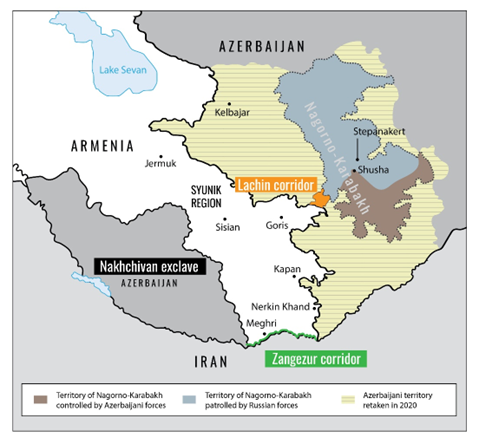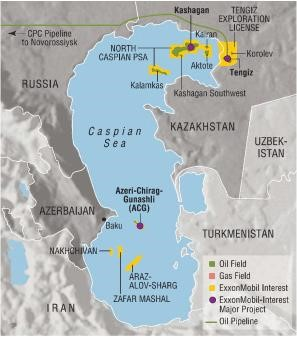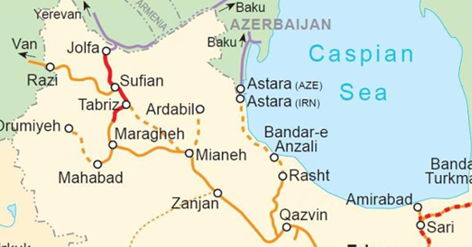
Indian Council of World Affairs
Sapru House, New DelhiChallenges in Iran-Azerbaijan Relations: Implications for the region
Tensions between Iran and Azerbaijan are simmering, particularly in the aftermath of the 2020 Nagorno-Karabakh conflict. The 27th January 2023, ‘attack’ on the Azerbaijani Embassy in Tehran further escalated the situation. President of Azerbaijan, Ilham Aliyev alleged the attack was a “terrorist act” and demanded an investigation. Iranian Foreign Ministry denied the Azerbaijani allegation but “strongly condemned” the incident, and stated that the matter is under investigation with high priority and sensitivity. However, Azerbaijan closed its Embassy in Tehran after the attack1. Following the attack on the Embassy, Iran started a military buildup on its border with Azerbaijan.2 On 6 April 2023, Azerbaijan summoned the Iranian Ambassador and expelled four Iranian diplomats from the country. The move came after Baku arrested six men who were allegedly plotting a coup in Azerbaijan, and were allegedly linked to the Iranian diplomats.3 These events show the escalating tension between both sides, which can have ramifications for the Caucasus region and beyond. The South Caucasus has immense significance due to its geostrategic location and energy, trade and connectivity potential. Both Iran and Azerbaijan are important partners in the multimodal project International North South Transport Corridor (INSTC). This article examines the rising tension between Iran and Azerbaijan and analyses its impact and implications. It also discusses opportunities of cooperation between the two countries.
Challenges in Iran-Azerbaijan Relations
Iran is situated in West Asia while Azerbaijan is located in the South Caucasus region and both are important regional players. Iran and Azerbaijan share a 765 km border, and both are littoral states of the Caspian Sea. The two countries also share cultural and religious values. Over the last three decades, ties between Iran and Azerbaijan have generally been 'cold' due to a variety of issues, including ethno-religious, political, and also Azerbaijan's strong connection with Turkey, Israel, and the West, as well as differences over the Caspian Sea and the Nagorno-Karabakh issue.

Source: www.washingtoninstitute.org
Nagorno-Karabakh Conflict
The Nagorno-Karabakh issue between Azerbaijan and Armenia is one of the critical factors in Iran-Azerbaijan relations. Nagorno-Karabakh is a disputed region located within Azerbaijan, inhabited mainly by ethnic Armenians, who have a strong cultural and historical connection with neighboring Armenia. When the Soviet Union collapsed in the early 1990s, Nagorno-Karabakh declared independence and sought to formally join Armenia. This move triggered a war between Armenia and Azerbaijan that lasted until May 1994 when a ceasefire agreement ended the hostilities. Iran shares borders with both Armenia and Azerbaijan. Initially, Iran maintained a neutral stance in the conflict, trying to avoid being engaged in the complicated regional dynamics. While Iran acknowledged Azerbaijan's sovereignty over Nagorno-Karabakh, it maintained friendly ties with Armenia and provided humanitarian assistance to the impacted populations. Since then, relations between Baku and Tehran have deteriorated dramatically.4
For Iran, Armenia is also a strategic and economic partner, both the countries share a common land border. Armenia is situated in a strategic position where it can serve as an important trade route for Iran to connect with Europe through Georgia and the Black Sea for supplying Iranian hydrocarbon energy to Europe. Therefore, Iran uses different foreign policy approaches, which contain a pragmatist view in the case of Armenia and Azerbaijan.5
In the 2020, Nagorno-Karabakh conflict, Azerbaijan retook control of most of the territories in the region which it had lost to Armenia in the 1990s. Azerbaijan’s success has fueled pro-Azerbaijani nationalist sentiment amongst ethnic Azeris in Iran, as many ethnic Azeris felt that Tehran should have supported Azerbaijan in the war.6
Ethnic and Cultural Reasons
Around 16 percent of Iran’s people are ethnic Azeris, who mainly inhabit the northern and northwestern provinces of Western and Eastern Azerbaijan. Ethnic Azeris are the second largest group in Iran after Persians.7 From Iran's perspective, the presence of a significant number of ethnic Azeris in Iran and their cultural and linguistic ties to Azerbaijan might cause instability and security concerns. This concern derives from the likelihood of separatist activities among Iranian Azeris, which might endanger the state's territorial integrity and weaken internal security. 8 On the other hand, Azerbaijan also has more than 100,000 Talysh people in the southern part of the country as per the 2009 census.9 Talysh are a rural minority population in Azerbaijan also known as Tolish or Talush. They share Azeri culture and are typically multilingual speaking Azeri and Talysh, a northwestern Iranian language. They are particularly common in southern Azerbaijan and the areas bordering Iran. Like the Azeris, they are predominantly Shi'a Muslims with strong ties to Iran. Baku believes that Armenia and Iran have a critical role in encouraging separatist tendencies among the Talysh people to use them as a ‘Threatening tool’ against Azerbaijan. These ethnic populations became a concerning point for both the countries. 10
Political Factors
After Azerbaijan's independence, Tehran desired to build good relations with Baku. Iran was one of the first countries to recognize Azerbaijan. On the other hand, Azerbaijan prioritized its relationship with Europe, Turkey and Israel. In terms of political structure, Azerbaijan is a secular state, which means that religion has no active part in governing the country. The constitution upholds the separation of religion and state, providing equal treatment to all religious groups. On the other hand, Iran is an Islamic Republic and Islamic/religious values serve as the foundation of the government structure.11 Islamic values influences Iranian foreign policy as well. During Azerbaijan President Abulfaz Elchibey's period (1992-1993), there was increase in Pan-Turkic political rhetoric which emphasized cultural and linguistic ties across various Turkish-speaking communities in Central Asia, the Middle East, and beyond. Iran was concerned about this trend, which it saw as potentially destabilizing, and its possible spillover effects into northern Iran, where ethnic Azeris live.
Conflict over Division of Hydrocarbon Recourses

Source: U.S Securities and Exchange Commission/Archives
There is a long standing dispute between Iran and Azerbaijan over the sharing of Caspian Sea’s hydrocarbon resources. In August 2018, the leaders of all the Caspian littoral states (Azerbaijan, Iran, Turkmenistan, Kazakhstan, Turkey and Russia) signed the Convention on the Legal Status of the Caspian Sea. During the convention, all the parties gave a ‘special status’ to the Caspian Sea and ended the long-standing debate on whether it was a sea or a lake, and settled the claim over its surface area. However, the convention does not answer all legal questions about the extraction of natural resources and the delineation of the seabed. For example, Iran and Azerbaijan have historically disagreed regarding ownership rights and access to oil fields of the Araz-Alov-Sharg exploration block over the extraction of natural resources.12 Both countries claim jurisdiction over parts of the sea, including its subsurface wealth. This agreement does not address the matter, leaving both countries with conflicting claims and disagreements.
External Factors
There are various external factors which also impacted the Iran-Azerbaijan relationship. Azerbaijan’s close security ties with Turkey have been viewed negatively by Iran. Relations between Baku and Ankara have been strong since Azerbaijan's independence. Linguistically, Azeris are Turkish-speaking, and have very close historical and cultural links to Turkey. Turkey, one of the closest allies of Azerbaijan in the region, also played an instrumental role in Azerbaijan’s success in the Nagorno-Karabakh conflict in 2020 and in 2022. As a result, Iran attempted to improve ties with Armenia to counterbalance what was viewed as a growing threat from Azerbaijan. Iran hoped to do this by ensuring security along its western border and protecting its own ethnic minority within the country. This tactic, however, worsened Iran's already delicate relations with Azerbaijan and added a new layer of complication to their bilateral relations. 13
Tehran is also concerned about its neighbor Pakistan's growing involvement in the region. Pakistan supports Azerbaijan on the Nagorno-Karabakh issue. They are also engaged in defense cooperation and military exercises. These geostrategic engagements have amplified tensions in Tehran with regard to its relations with Azerbaijan.
Perhaps the most significant concern for Iran is Azerbaijan’s growing relationship with Israel. Iran has long accused Azerbaijan of providing grounds for Israeli espionage activities aimed at weakening its regional position and nuclear programme.14 Azerbaijan has strengthened its bilateral relations with Israel, mainly in the area of defense cooperation. Israel supplied sophisticated weaponry, including drones used in the Karabakh conflict in 2020. Israel and Azerbaijan have long-term strategic collaboration, and Israel has trained Azerbaijan's military and played a significant role in building Azerbaijan's military capabilities.15 Israel benefits from the relationship because it has direct access to Iran for intelligence operations due to Azerbaijan's geographical location. Iran considers that the relationship gives Israel a strategic foothold on its northern borders.16
On January 28, 2023, an armed drone struck a building in Isfahan, a prominent Iranian missile production and research and development center. Iran asserted that Israel was behind the Isfahan incident17. In response, Israeli officials denied responsibility for the attack, but Israeli media appeared to acknowledge Tel Aviv's responsibility while claiming success. On March 29, 2023 Azerbaijan opened its Embassy in Israel aimed to further strengthen military and economic ties between the two countries, which further complicated the relations between Iran and Azerbaijan.18
Prospects for Cooperation between Iran and Azerbaijan

Source: www.railwaygazette.com
Despite historical differences and ongoing challenges, Iran and Azerbaijan have significant prospects for cooperative engagements, particularly in the fields of connectivity and energy, the two primary areas requiring bilateral and multilateral cooperation. On September 9th 2022, Azerbaijan, Russia, and Iran issued the Baku Declaration following the first trilateral meeting on further developing the ongoing multimodal project of INSTC. On May 3, 2023, Russia and Iran signed an agreement to launch the construction of the remaining part of the Astara-Rasht-Qazvin railway with Russian funding19. The railway will link Rasht, a coastal city in Iran near the Caspian Sea, with Astara, a border town in Azerbaijan. This railway line will serve as a vital link in the INSTC project and will connect Azerbaijan, Georgia, and Russia with Iran on the Persian Gulf. Azerbaijan is also an important member of this project. Therefore Iran and Azerbaijan are jointly working on the last section of the Astara-Rasht-Qazvin railway line. Its implementation will complete the last remaining gap of the 164-kilometer railroad section from the Iranian city of Rasht to Azerbaijan’s Astara province. Previously, US sanctions against Iran and Azerbaijan's failure to complete its loan commitment to Iran posed significant challenges to this project.20
Both Iran and Azerbaijan have significant energy reserves, and both the countries seek to be energy suppliers to other regions. Therefore, both the countries are working on the remaining section of the Rasht Chelavend gas pipeline, which is the shortest route for Russian gas to reach Iran through Azerbaijani territory.21 Both Iran and Azerbaijan are also involved in developing Southern Gas Corridor (SGC), a key project aimed at delivering natural gas from the Caspian Region to Europe via multiple pipeline systems.22 These projects have the potential to improve economic engagement and decrease tension between the two countries as well as the region.
India’s Engagement with Iran and Azerbaijan
Both Iran and Azerbaijan are important for India because of two primary reasons: inter-regional connectivity and energy security. Iran’s Chabahar port is crucial for INSTC which will benefit India's commercial prospects by linking it to Central Asian nations and Europe. Azerbaijan is an important country in the South Caucasus and India’s biggest trading partner in the region. Azerbaijan also enjoys a strategic position and links two major international projects, INSTC and the East-West Transport Corridor (EWTC).23 Both Iran and Azerbaijan can play a crucial role in diversifying India’s energy needs. India is also one of the biggest buyers of Azerbaijani oil and one of the country's largest investors.24
Conclusion
Over the past 30 years, relations between Iran and Azerbaijan have remained relatively cold. The 2020 Nagorno-Karabakh conflict changed the region's geopolitics once again and negatively affected Iran-Azerbaijan bilateral relations. Azerbaijan’s relations with regional countries like Turkey and Israel concerned Iran the most. Even after the attack on the Embassy, Iranian President and his Azerbaijani counterpart agreed that this incident should not affect bilateral relations. Despite these geopolitical developments, there is much for the two countries to collaborate on, including connectivity and energy, which would benefit the region and beyond.
*****
*Biswarup Baidya, Research Intern, Indian Council of World Affairs, Sapru House, New Delhi.
Disclaimer: The views are of the author.
Endnotes
- Jozwiak, R., & Tayebi, A. (n.d.). One Person Shot Dead At Azerbaijan's Embassy In Iran; Baku Evacuates Staff. Radio Free Europe. Retrieved March 28, 2023, from https://www.rferl.org/a/one-person-shot-dead-azerbaijanembassy-iran/32241998.html
- Agayev, Z. & Motevalli, G. (2023, February 8). Analysis | Azerbaijan, Iran and Rising Tensions in the Caucasus. The Washington Post. Retrieved June 8, 2023, from https://www.washingtonpost.com/business/energy/azerbaijan-iran-and-rising-tensions-in-the-caucasus/2023/02/07/f2f65480-a6b0-11ed-b2a3-edb05ee0e313_story.html
- Motamedi, M. (2023, April 8). Analysis: Will Azerbaijan-Iran tensions lead to war? Al Jazeera. Retrieved June 8, 2023, from https://www.aljazeera.com/news/2023/4/8/analysis-will-azerbaijan-iran-tensions-lead-to-war
- Khoshnood, A., & Khoshnood, A. (2020, October 16). The Armenian-Azerbaijani Conflict and Its Implications for Iran. Lund University Research Portal. Retrieved March 5, 2023, from https://portal.research.lu.se/en/publications/the-armenian-azerbaijani-conflict-and-its-implications-for-iran
- ERENDOR, M. E., & ÖZTARSU, M. F. (2019, March 28). Iranian Relations with Azerbaijan and Armenia: A Comparative Approach in the Case of Pragmatist Politics. DergiPark. Retrieved March 5, 2023, from https://dergipark.org.tr/tr/download/article-file/680362
- Dermoyan,H. (2021, October 6). The Escalating Tensions Between Iran and Azerbaijan. EVN Report. Retrieved March 14, 2023, from https://evnreport.com/politics/the-escalating-tensions-between-iran-and-azerbaijan/
- Dabell, B. (2013, September 3). Iran Minorities 2: Ethnic Diversity. The Iran Primer. Retrieved March 5, 2023, from https://iranprimer.usip.org/blog/2013/sep/03/iran-minorities-2-ethnic-diversity
- Souleimanov, E. A., & Kraus, J. (2017,September). Iran’s Azerbaijan Question in Evolution: Identity, Society, and Regional Security. Central Asia-Caucasus Institute and Silk Road Studies Program. Retrieved June 8, 2023, from https://isdp.eu/content/uploads/2017/09/2017-souleimanov-kraus-irans-azerbaijan-question-in-pdf
- Azerbaijan Talysh. (n.d.). Minority Rights Group International. Retrieved June 8, 2023, from https://minorityrights.org/minorities/talysh/
- Khoshnood, A., & Khoshnood, A. (2020, October 16). The Armenian-Azerbaijani Conflict and Its Implications for Iran. Lund University Research Portal. Retrieved March 5, 2023, from https://portal.research.lu.se/en/publications/the-armenian-azerbaijani-conflict-and-its-implications-for-iran
- Kazemipur, A., & Rezaei, A. (2003). Religious Life under Theocracy: The Case of Iran. Journal for the Scientific Study of Religion, 42(3), 347–361. Retrieved June 8, 2023, from http://www.jstor.org/stable/1387739
- Whitney, C. (2018,September). The Convention on the Legal Status of the Caspian Sea - A sea or not a sea: that is still the question. Norton Rose Fulbright. Retrieved March 5, 2023, from https://www.nortonrosefulbright.com/en/knowledge/publications/5f222b95/the-convention-on-the-legal-status-ofthe-caspian-sea---a-sea-or-not-a-sea-that-is-still-the-question
- ERENDOR, M. E., & ÖZTARSU, M. F. (2019, March 28). Iranian Relations with Azerbaijan and Armenia: A Comparative Approach in the Case of Pragmatist Politics. DergiPark. Retrieved March 5, 2023, from https://dergipark.org.tr/tr/download/article-file/680362
- Grove, T. (2012,October 1). Insight: Azerbaijan eyes aiding Israel against Iran. Reuters. Retrieved June 8, 2023, from https://www.reuters.com/article/us-iran-israel-azerbaijan-idUSBRE88T05L20121001
- Kogan, E. (2023, April 3). Israel and Azerbaijan: Trusted friends and reliable partners. Middle East Institute. Retrieved June 8, 2023, from https://www.mei.edu/publications/israel-and-azerbaijan-trusted-friends-and-reliable-partners
- Edelstein, D. (2021, March 10). Potential Gains for Israel After Azerbaijan's Victory in Nagorno-Karabakh. Just Security. Retrieved June 8, 2023, from https://www.justsecurity.org/75135/potential-gains-for-israel-after-azerbaijans-victory-in-nagorno-karabakh/
- Chulov, M. (2023, January 29). Drones target Iranian weapons factory in central city of Isfahan. The Guardian. Retrieved June 8, 2023, from https://www.theguardian.com/world/2023/jan/29/drone-attack-hits-iran-ammunition-factory-reports
- LAZAROFF, T. (2023, March 29). Azerbaijan opens Tel Aviv embassy, Israel seeks tighter anti-Iran ties. The Jerusalem Post. Retrieved June 8, 2023, from https://www.jpost.com/israel-news/article-735852
- Deal With Russia on Completing Rasht-Astara Railroad Likely. (2023, May 5). Financial Tribune. Retrieved June 8, 2023, from https://financialtribune.com/articles/domestic-economy/117970/deal-with-russia-on-completing-rasht-astararailroad-likely
- Kaleji, V. (2022, May 16). Will Russia Complete Iran's Rasht–Astara Railway? The Jamestown Foundation. Retrieved March 6, 2023, from https://jamestown.org/program/will-russia-complete-irans-rasht-astara-railway/
- Remaining section of Rasht-Chelavend gas pipeline will be completed in 2-3 months. It will add 5.5 bcm to gas transportation capacity between Iran and Azerbaijan. (2023, February 16). News Central Asia. Retrieved June 8, 2023, from https://www.newscentralasia.net/2023/02/16/remaining-section-of-rasht-chelavend-gas-pipeline-will-be-completed-in-2-3-months-it-will-add-5-5-bcm-to-gas-transportation-capacity-between-iran-and-azerbaijan/
- Gurbanov, I. (2018, November 26). Despite US Sanctions on Iran, Green Light for the Southern Gas Corridor. The Jamestown Foundation. Retrieved June 8, 2023, from https://jamestown.org/program/despite-us-sanctions-on-iran-green-light-for-the-southern-gas-corridor/
- Wani, A. (2023, February 3). Slow, Not Steady: Assessing the Status of India-Eurasia Connectivity Projects. ORF— Observer Research Foundation. Retrieved March 6, 2023, from https://www.orfonline.org/research/assessing-the-status-of-india-eurasia-connectivity-projects/
- Malhotra, A. (2020). The South Caucasus: Transition from Subjugation to Independence. ICWA/Macmillan Education.















